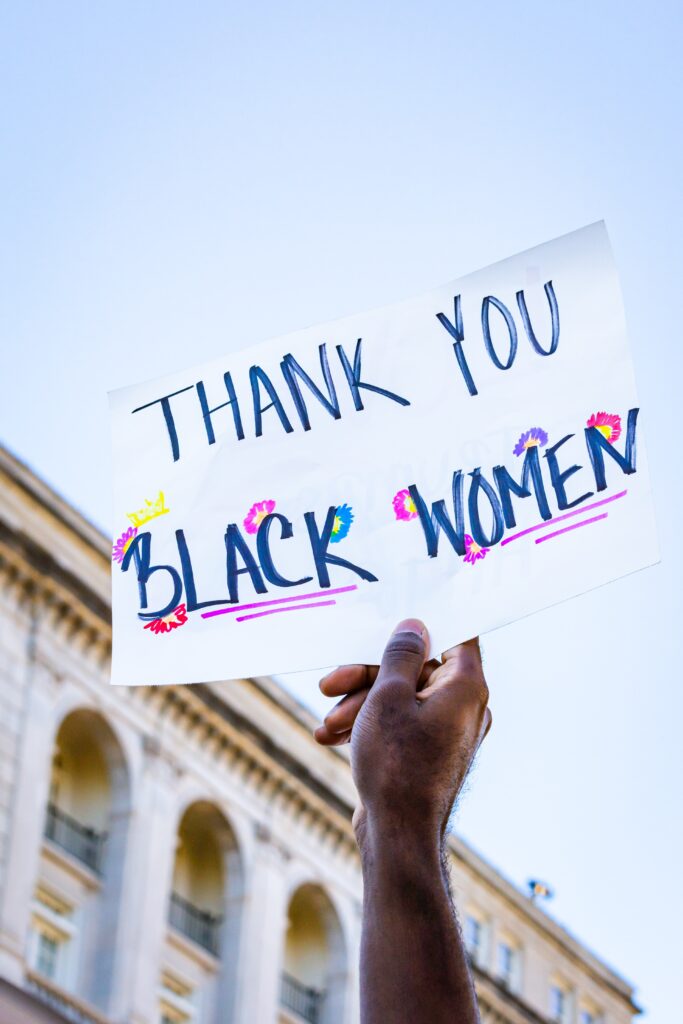Based on the values taught by her mother- a commitment to community, love and faith, Isabelle Ehiorobo interrogates gendered notions of care and responsibility while exploring how these notions uniquely shape migrant women’s experiences.
by Isabelle Ehiorobo
Picture credit: Jackson David @Unsplash
From a young age, window shopping has always offered me a kind of comfort. With darting eyes and deep gazes, I often found joy on the pages of swollen Argos catalogues and excitement during strolls across busy shopping malls.
Whilst browsing, I often found myself captured by the beauty of an item, inspecting and analysing it for any spots or blemishes. I pictured what I could do with it, where I would take it and how I may be received once I had it.
These thoughts would enthral me briefly before I was quickly snapped back into reality by a short glance at the price tag. My mother often shares memories of her habit of window shopping on Brixton High Street in the 90s.

At 25 years old, she had come to London alone to pursue her dreams in a land marked by its industrial greatness & promise of a better future. Window shopping for her was a site for inspiration and new possibilities.
On one occasion, she recalls strolling through the high street on a spring afternoon in search of some everyday clothes. She visited a clothing store and ventured inside to pick up some new underwear. Whilst analysing and inspecting, she was suddenly gript by memories of home.
Nigeria, in all its richness and beauty, was becoming a dangerous place to live. During the 1990s, Nigeria faced a steep economic decline and a significant fall in living standards. These conditions directly reflected the political instability and corruption that had become commonplace.
“No one leaves home, unless home is the mouth of a shark” – Warsan Shire
During the time in the store, my mother felt a deep pain in her chest at the thought of her younger sisters, who were living in Nigeria at the time. The reality that they could not afford an item as simple as underwear due to their father’s sudden redundancy was complicated for her to come to terms with.
In that brief moment, she was reminded of her responsibilities, undoubtedly through a source of pain but simultaneously through a commitment to the service and care of her family.
While renovating my room earlier this year, I came across a drawer full of letters that date back to 1992. Most of these letters had been written by my Grandparents, who wrote from a small town in Southern Nigeria called ‘Uwherhu’ to update my mother on the happenings back home.

Reading these letters brought my mother and me to tears many times. My grandmothers’ words were sharp, and the weight of her message transcended the page. Each letter offered a deafening reminder of the responsibilities on my mother’s shoulders.
Although my mother recognised her dreams as necessary, she also sought to prioritise the welfare of her family alongside them. For many migrant women, commitment to the care and service of their family is their first responsibility.
More often than not, there is an expectation for them to sacrifice their time to provide care for those that they love. Feminist thinkers have long questioned the notion that the provision of care is the responsibility of women.
For many migrant women, commitment to the care and service of their family is their first responsibility.
Patriarchy has positioned care as women’s work, placing the well-being of communities on their backs. This is particularly visible with working-class women of colour, who carry a significant amount of emotional labour whilst they are insufficiently cared for by statutory services and their families.
In a 2011 interview, feminist writer Carol Gilligan addresses the ethic of care, stating, “It is crucial to clarify that within a patriarchal framework, the ethics of care is a “feminine” ethic, whereas, within a democratic framework, it is a human ethic”.
As a teenager, I would continuously lament to my mother about how frustrated I felt seeing so many relatives coming in and out of our home. Home, to me, was about prioritising the self and reclaiming autonomy over my personal space.

Contrary to my understanding of home, our house was always open for relatives and old friends to lay their heads. For years, our food was frequently distributed across families, and our clothes were never too old to be sent to Nigeria for my distant cousins to wear.
This way of living was hard for me to comprehend at first. Raised in a culture that prioritises individualism, I believed that no labour or inconvenience should be without reward. “Where are their own houses and food?” I often asked myself, “What are we getting in return for all of this?”.
In her book Teaching Community, bell hooks writes, ‘Service as a form of political resistance is vital because it is a practice of giving that eschews the notion of reward’. A prevalent culture of dominance has meant that service to others is devalued, and those that choose to serve are perceived as subordinate.
The labour of our mothers has certainly been unjust, but it has not been in vain.
Throughout my childhood, I witnessed my mother serve many people with her time, space and care. In response to my frustrations and ongoing questions, my mother would share stories of life before she migrated to the UK. She would sing the praises of relatives who opened their doors for her, speak passionately of the friends that edified her spirit with words of hope, and speak lovingly of those who ensured her stomach was always full. What better way to give back to those that once cared for you?
Migrant women are positioned at the margins of nations, yet they remain anchored in their commitment to upholding communities through service and care. Responsibility is a radical response to a culture that is hyper-fixated on the self. When we are responsible for one another, we recognise the duty of care we have to one another. Patriarchy has wrongfully branded the principle of care as women’s work, subjecting them to excessive emotional labour.
Through observing the experiences of migrant women, it is clear that there is a great need to redistribute the burden of caregiving equitably. The labour of our mothers has certainly been unjust, but it has not been in vain. Through their teachings and shortcomings, we can recognise service and community care as essential pillars of collective human survival.
Isabelle Ehiorobo is a Multiple Disadvantage Advocate at Women and Girls Network, committed to tackling systematic injustice experienced by ethnic minority women and people. Isabelle has a legal background through her undergraduate degree and writing on Criminal Law Reform published by the International Network for Hate Studies.


The labour of our mothers has certainly been unjust, but it has not been in vain.
A very true statement, this piece is very relatable.
This is a reality I see but a perspective I’ve never really considered, ‘‘twas an enlightening read.